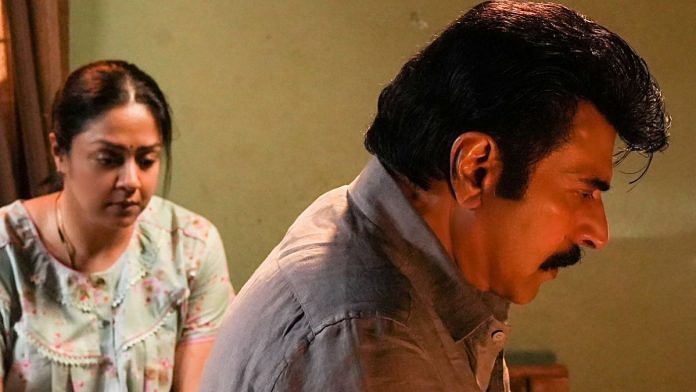In many ways, Mammootty’s Kaathal – The Core feels like Malayalam cinema’s apology for Dileep’s Chanthupottu. The 2005 film did irreparable damage to Kerala’s queer community and has a laundry list of shortcomings. But Jeo Baby’s 2023 directorial is sensitive and normalises the existence of an LGBTQIA++ community in the state, beyond the big cities. It does all this while weaving together multiple threads—familial, political, religious and legal—and tackling the taboo of divorce.
Apart from its path-breaking content and Mammootty’s masterclass in both acting and producing, what stood out was the language. The film takes place in two spaces: the village of Teekoy and the district court in the neighbouring town of Pala.
In the village, there is no word for homosexuality. The gap is filled with euphemisms— degenerate, strange, unfamiliar, different, a loose screw.
Once we enter the court compound, the language shifts. Gay, homosexual and opposite sex (all in English) enter the script. The Malayalam word for gay—svavargaanuraagi, a word as uncommon and formal as it is hard to pronounce—also makes an appearance. Ironically, Shabdkosh, an online regional language-to-English dictionary, uses a popular slur for gay men as the translation of this word.
It may seem that taboo is the reason why villagers don’t address homosexuality directly. But it remains unsaid because there are no words to say. Malayalam and most regional Indian languages have no words to describe queerness. At least nothing apart from the ones that are too formal and/or a slur.
This gap in language has been a hurdle to acceptance for various marginalised communities around the world, from Dalits in India to African Americans and Native Americans in the US.
Baby and writers Adarsh Sukumaran and Paulson Skaria have highlighted this expertly and without being preachy.
Language and queerness
No one knows the importance of language in film better than Kerala’s queer community.
The earlier mentioned Dileep film’s biggest ‘impact’ was introducing into Malayalam its most popular insult for the LGBTQIA++ community—Chanthupottu, the name of the movie itself. If you’re a queer Malayali or even a slightly effeminate man, then it’s a word that’s followed you around like a disease.
In Kaathal, the purposeful avoidance of homophobic slurs is a breath of fresh air. They are not even used to punctuate the discrimination faced by queer folk.
In fact, until you enter the court premises for the first time, the audience is not even aware of why the villagers are antagonising Mammootty’s character, Mathew Devassy, a retired bank employee and community leader.
He’s been convinced to stand for the elections by the local Left party, and that’s when news of a case comes out. We know it’s a “nasty” one. But we don’t know much else. The breadcrumbs lead us to divorce.
The film is set in a prominently Roman Catholic community; even the opening shot is that of a church. And Mathew is in the front row at mass. Maybe that’s why divorce is ‘nasty’. The gaps in the language make you start to fill in the blanks on your own.
Another clue as to what’s happening comes when the party decides to continue with Mathew as their candidate. He’s called a “progressive” choice. Still, there is no definitive answer as to why the village is gawking at him.
The next clue comes with a dialogue—What business do you have with Mathew?— directed at Thankan, who is played by Sudhi Kozhikode. The only thing we know about this character up till now is that he runs a driving school, not enough to put the puzzle pieces together. It’s later revealed that he’s named in the divorce petition as Mathew’s “male friend”.
Also read:
Power of right words
Without the right words, the puzzle remains incomplete. And in a subversion of the popular phrase—the film tells, not shows, the big picture.
While explaining the case brought by his wife, played with utmost care by Jyothika, Mathew’s lawyer says— “In most cases, the petition would read adultery, but perhaps, because your situation didn’t involve the opposite sex, the term cruelty has been used”.
It’s very matter-of-fact, almost a passing mention, and steeped in the formality of a lawyer-client interaction, but it shows the power of having the right words.
The film also has a representative from the real-life LGBTQIA++ advocacy group Queerala, who offers to support Mathew in his legal battle. But here, too, the language—LGBTQIA++, coming out— is foreign to the protagonist. Interestingly, this, too, happens in the court compound.
It draws attention to how even regional queer rights movements in India lack the words to connect with people beyond the urban bubble.
An expansion of rights should begin with attacking language for its barrenness. Kaathal has drawn attention to it, and now the work truly begins.
(Edited by Zoya Bhatti)



